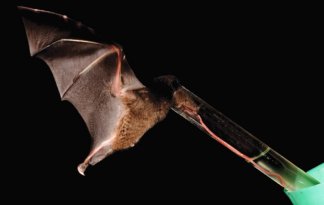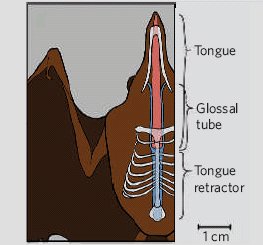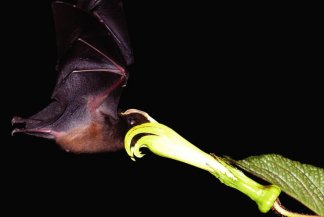A Tongue and a Half
|
If there were a prize for animal rudeness, a small South American bat would surely be in the running. The creature doesn't just stick out its tongue. It shoots it way, way out. In fact, its tongue is longer than its body. At 1.5 times the animal's body length, the bat's tongue sets a record for the longest mammal tongue in relation to body size. Among all animals with backbones (called vertebrates), only chameleons, which are reptiles, have longer tongues. Theirs can be twice the length of their bodies.
A type of small bat found in South America has an amazingly long tongue. Here, the bat stretches out its skinny tongue to feed from a test tube containing sugar water. Murray Cooper Nathan Muchhala of the University of Miami in Coral Gables, Fla., discovered the night-roaming bat in the Andes Mountains in Ecuador. He named it Anoura fistulata. The bat, which sips nectar from flowers, has a long, pointy lower lip. When it feeds at a flower, its tongue shoots out along a groove in its lower lip before quickly pulling back between sips. To measure the length of its tongue, Muchhala encouraged the bat to drink sugar water through a drinking straw. Then, he measured how far its tongue reached. The tongues of other local nectar bats went down 4 centimeters into the straw, the scientist found. The tongue of A. fistulata reached more than twice that far. "I was amazed," Muchhala says. Next, Muchhala studied examples of these bats found in museum collections. He discovered that the base of the bat's tongue is deep down in the animal's ribcage, near the heart, rather than at the back of its jaw. Special muscles within the tongue help it lengthen quickly.
Between sips, this bat's tongue slips back into a tube (shown in blue) that runs from the back of the bat's mouth down into its chest. Nathan Muchhala In the bats' fur, Muchhala found pollen grains of a pale-green, trumpet-shaped flower called Centropogon nigricans. These flowers are about as deep as A. fistulata's tongue is long, and nectar collects at the bottom of each flower's tube. Muchhala videotaped some of these flowers for more than a week. He found that A. fistulata was their only visitor. He suggests that just these bats pollinate the flowers.
This bat's tongue is just long enough to reach deep into a particular flower to obtain nectar. Nathan Muchhala Scaly anteaters are the only other animals known to have tongue tubes in their chests. Their tongues stretch about half as long as their bodies. Anteaters eat from ant nests, which are like the deep flowers that bats feed from. Both animals, it seems, came up with similar strategies for getting food out of hard-to-reach places. |











